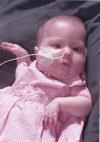A national review of the quality of care for seriously ill children is being launched by the Care Quality Commission following the death of a baby more than a decade ago.
- CQC to review care for babies with hypertension and tracheostomies
- First time the regulator has looked into care across the NHS
- Probe follows death of baby Elizabeth Dixon after poor care in 2001
It is the first time the CQC has used its powers to carry out a review of an aspect of care across the NHS. The watchdog plans to examine standards of care for deteriorating newborn babies with high blood pressure, as well as how suspected problems are highlighted during handover between clinical teams. It will also look at the care offered to children with tracheostomies in the community.
A scoping report suggests the review could lead to recommendations for new clinical guidance and changes to commissioning of services in the community.
The review, which will inspect 26 NHS trusts, will begin next month and has been established by the regulator following the death of baby Elizabeth Dixon in 2001.
- More news and resources on patient safety
- Patient safety: Errors need to be minimised
- McLellan: We need a sustainable solution to care failure investigations
She was left permanently brain damaged when staff at Frimley Park Hospital failed to treat her high blood pressure for 15 days. She suffocated to death less than a year later when a newly qualified agency nurse failed to keep her tracheostomy tube clear.
Plans for an independent investigation into her poor care and an alleged cover-up following her death collapsed last year when NHS England chief executive Simon Stevens decided the national body would not take part.
NHS England said it was “not and has never been an investigatory body”, though it does have the power to investigate patient care in its role as a commissioner.
CQC chief executive David Behan admitted last year a “gap in the system” was preventing the investigation of historic patient complaints.
The CQC’s deputy chief inspector of hospitals, Edward Baker, who is leading the review, told HSJ the case raised “some really serious issues”.
He said: “As a paediatrician, I recognise some of those aspects are things that are not right even still. They may not have been right in 2000, but have we got these right now? The answer is we don’t know unless we go out and look.”
He said the review would be carried out alongside existing inspections and would involve speaking to families, examining data and patient notes, as well as looking at what protocols and guidance is available to staff and their skills.
The review, designed following advice from bodies including the British Association of Perinatal Medicine and medical royal colleges, will be limited to young infants to ensure it can be completed by March next year. Professor Baker said the CQC was open to recommending further work in older age groups if necessary.
He added: “This is not something we have done before and it may provide us with a methodology to do this in other areas as well.”
While the CQC review will not consider Elizabeth’s case specifically, Professor Baker said: “I think every child death should be investigated. There hasn’t been an investigation into Elizabeth’s death but we are using her story in a way that I hope will make a big difference to children.
“If there are problems with aspects of care that Elizabeth had that are now reflected in current practice we will say that and that it needs to be looked at. I hope her parents will take some real comfort from our review and if it does find problems which can then be addressed they can be confident children won’t suffer similar problems that Elizabeth had.”
Elizabeth’s parents Anne and Graeme Dixon told HSJ: “We are grateful that the CQC review will consider some aspects of the failings in Elizabeth’s treatment and we do hope it leads to better, safer care for other children like our daughter.
“But we are very disappointed that no organisation is prepared to offer us a full and proper investigation into what happened to Elizabeth and the subsequent system-wide cover-up that followed her death, as we were promised last year.
“This is very distressing for our family as the CQC review will look at just one small part of what happened to Elizabeth and it has taken us over a decade to find out just some of the truth and already a year has gone by with no further progress.”
They added: “You can’t have a system where organisations pick and choose when they decide to investigate serious poor care and wrongdoing.”
The case of Elizabeth Dixon

Elizabeth Dixon was left with brain damage after nurses and doctors at Frimley Park Hospital, where she was born prematurely in 2000, failed to monitor or treat severe high blood pressure for 15 days.
She was left permanently disabled as a result of these failings and had a tracheostomy, or tube inserted into her windpipe. She suffocated and died 10 days before her first birthday when a newly qualified agency nurse, who had no experience of caring for children with tracheostomies, failed to keep her breathing tube clear.
The nurse, Joyce Aburime, was later struck off by the Nursing and Midwifery Council for failures related to Elizabeth’s care.
Her parents did not learn the truth about what caused Elizabeth’s disability until a review in October 2013 by Malcolm Coulthard, a consultant paediatric nephrologist. In his report he concluded it was “overwhelmingly likely” the high blood pressure caused Elizabeth’s brain damage and “led ultimately to her early death”.
Dr Coulthard said staff at Frimley Park treated Elizabeth for a non-existent infection despite medical notes making clear her high blood pressure should be monitored. Notes from her time in hospital later went missing and were destroyed. The hospital apologised to the family in 2013.
Her parents have raised concerns around the accuracy of her death certificate and cremation forms as well as evidence given at an inquest in 2009 which concluded that Elizabeth was born with a condition that was “incompatible with human life” and that she had asphyxiated but ruled out any neglect.




























6 Readers' comments